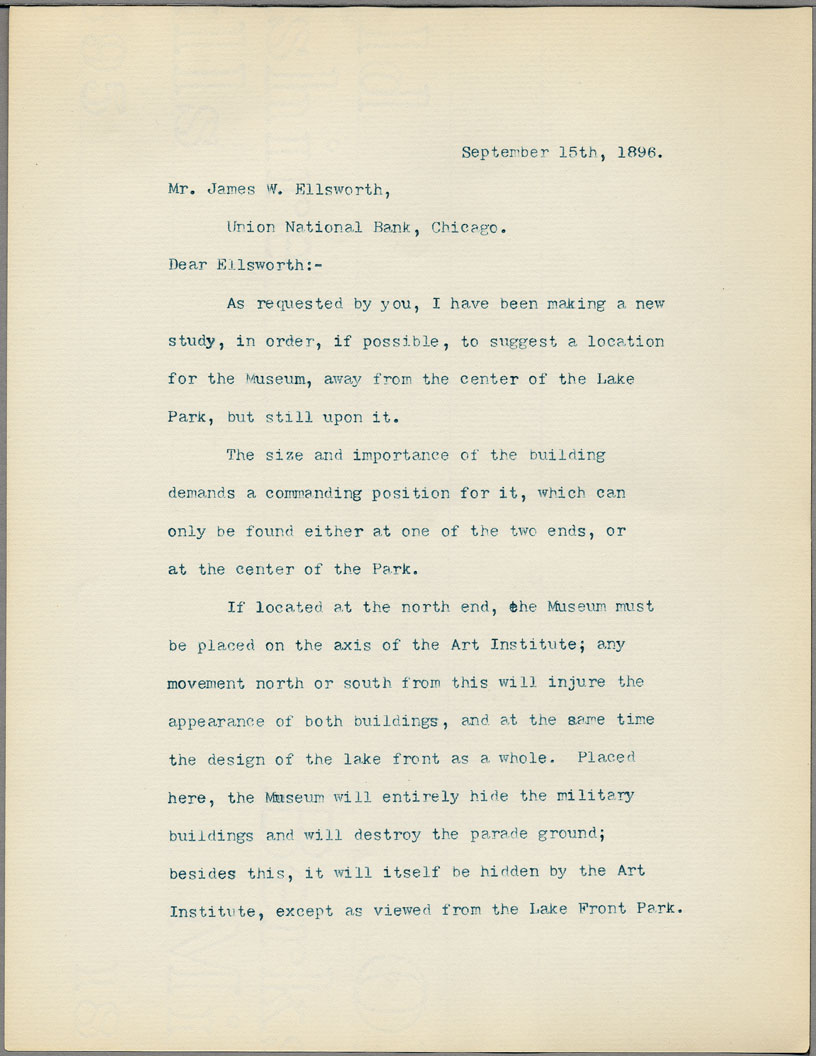 |
TITLE:
DATE:
SUMMARY:
PDF:
|
Burnham, Daniel H., to James W. Ellsworth
09/15/1896
Burnham knew that he needed to sell his plans to the South Park Commission, which presided over Jackson and Grant Parks. Writing to Commission President James W. Ellsworth, Burnham responded to objections to placing the Field Museum in the center of the lakefront, impressing upon the commissioner its importance as a unifying structure in the overall design.
DOWNLOAD this document. (4 pages)
|
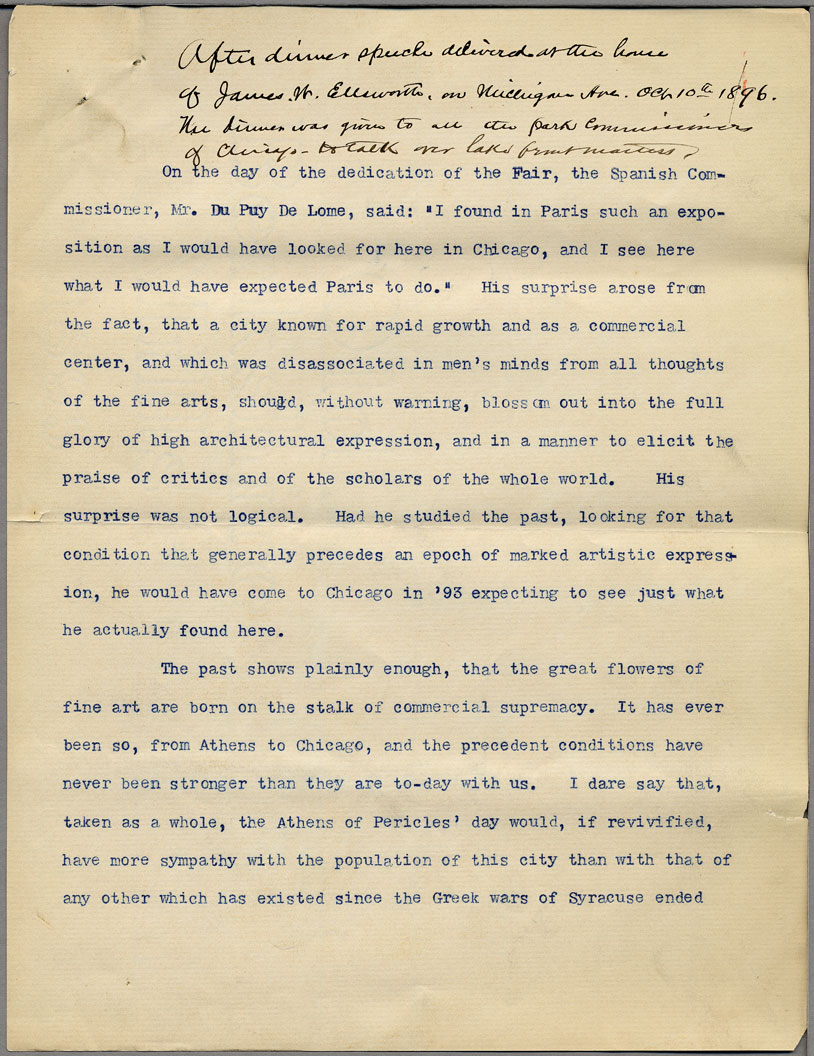 |
TITLE:
DATE:
SUMMARY:
PDF:
|
Speech delivered to the South Park Commission at the home of James Ellsworth, October 10, 1896
10/10/1896
Burnham often compared Chicago to beautiful and flourishing cities of the present and past. In this speech, Burnham likens Chicago to Athens in the age of Pericles. He describes Athens as a city built by young, optimistic immigrants. From this comparison, he goes on to explain his view that the people of Chicago are brave adventurers, come from around the country and the world, poised to create a splendid and prosperous city.
DOWNLOAD this document. (6 pages)
|
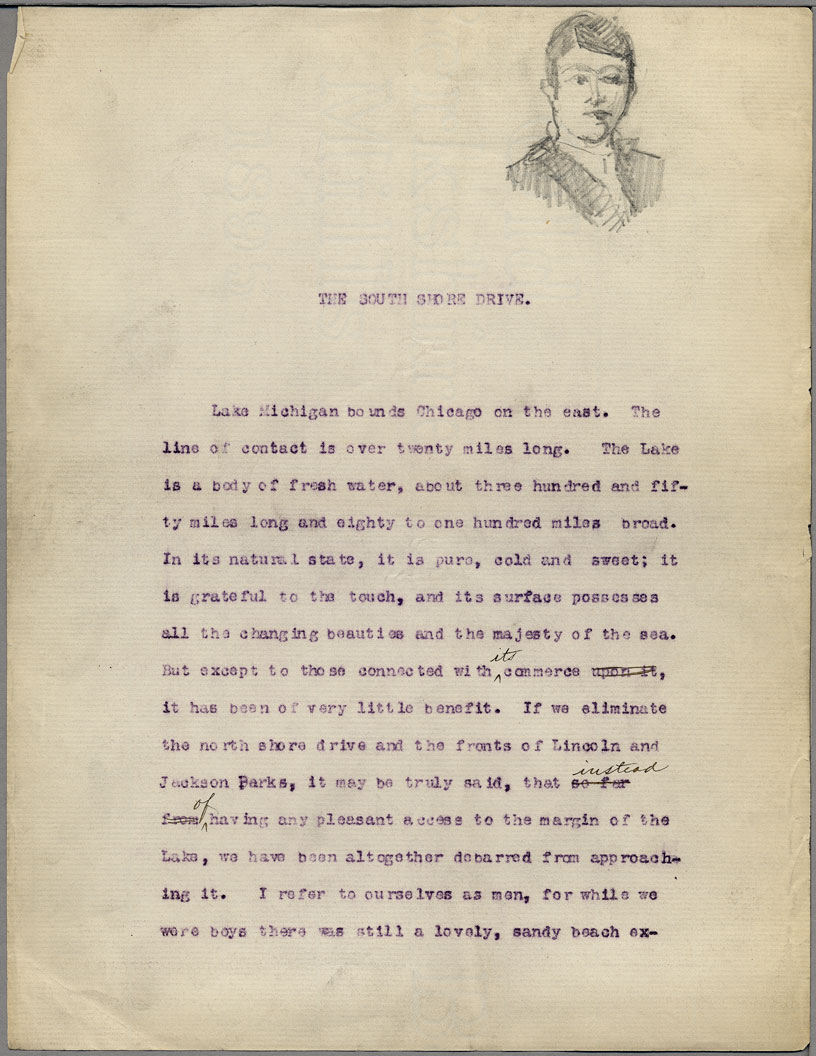 |
TITLE:
DATE:
SUMMARY:
PDF:
|
"The South Shore Drive," first draft of a speech to be delivered before the Chicago Literary Club December 14, 1896, the Art Institute of Chicago December 15, 1896, and the Back Lot Club February 18, 1897
12/14/1896
While Burnham always explained the details of his plans and the practical considerations for their viability, he also often spoke of them in philosophical and poetic terms. In this speech delivered to the Literary Club Burnham speaks eloquently about Lake Michigan and Chicago's failure to use it for recreation. Inviting his audience to imagine his beautification scheme, he paints the lake as a place for both solitary self-reflection and social activity.
DOWNLOAD this document. (40 pages)
|
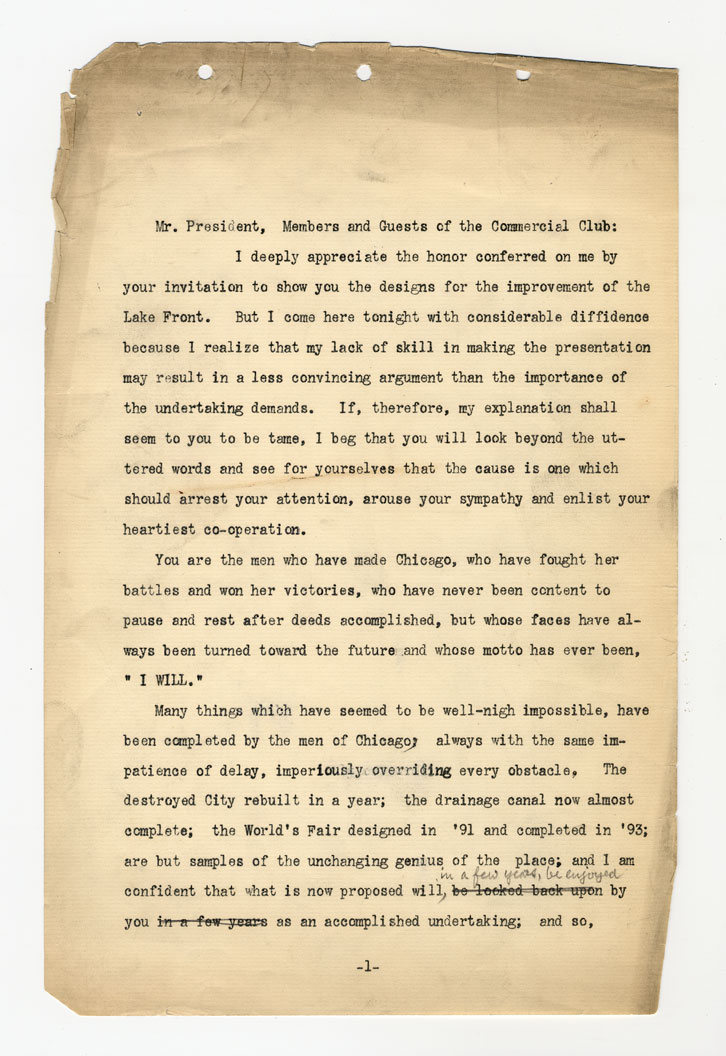 |
TITLE:
DATE:
SUMMARY:
PDF:
|
Speech delivered to the Commercial Club of Chicago
[1896]
More than a decade before the Commercial Club would become involved with the production of the Plan of Chicago, Burnham addressed the group with his ideas for the lakefront. The opening remarks are telling of Burnham's acute desire to please this group of peers; apologizing for his "lack of skill in making the presentation," he means to flatter his audience and show his deference. One of his more intriguing points is that an improved lakefront will help to "assimilate" the 1.5 million people who have come to Chicago in the past 15 years.
DOWNLOAD this document. (18 pages)
|
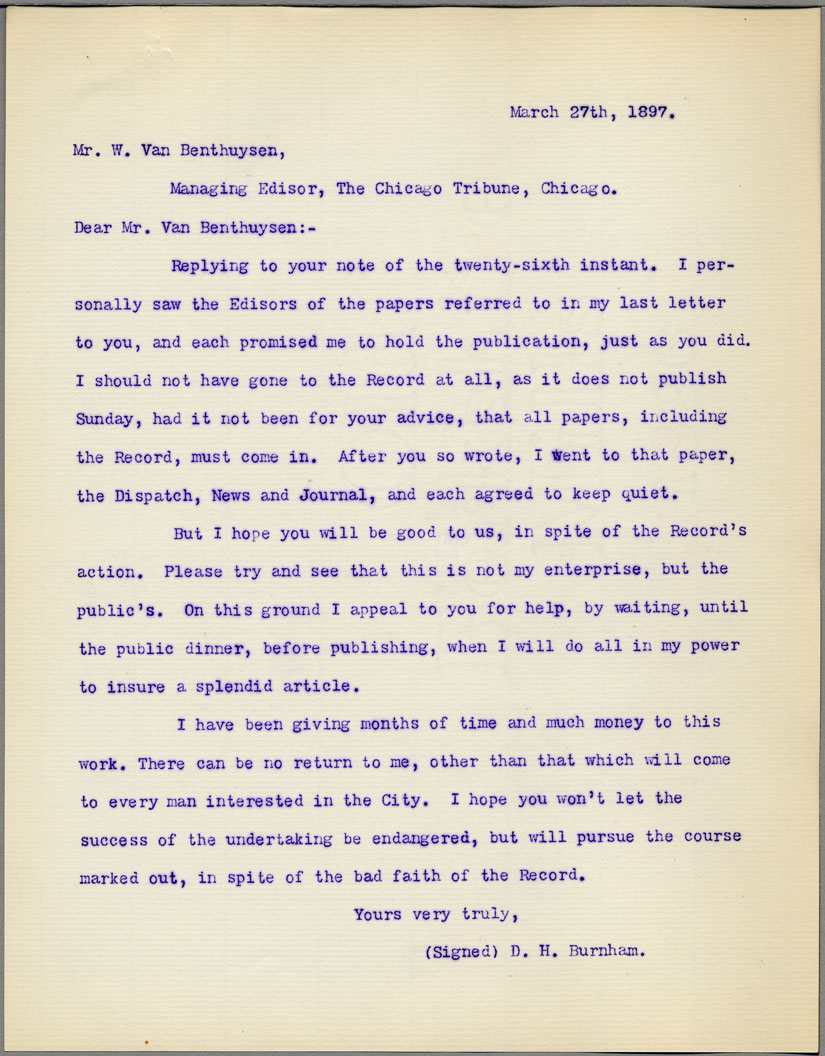 |
TITLE:
DATE:
SUMMARY:
PDF:
|
Burnham, Daniel H., to W. Van Benthuysen
03/27/1897
Burnham's public relations strategies for this project anticipated those he would use while creating the Plan. In this letter to the managing editor of the Chicago Tribune, Burnham urges the paper to hold publication of news of his progress, despite the fact that a competing paper, the Record, has gone ahead. Burnham insists that his work is in the public interest, and that early announcement of it will only serve to damage the potential of the plans to come to fruition and serve the public good.
DOWNLOAD this document. (1 page)
|
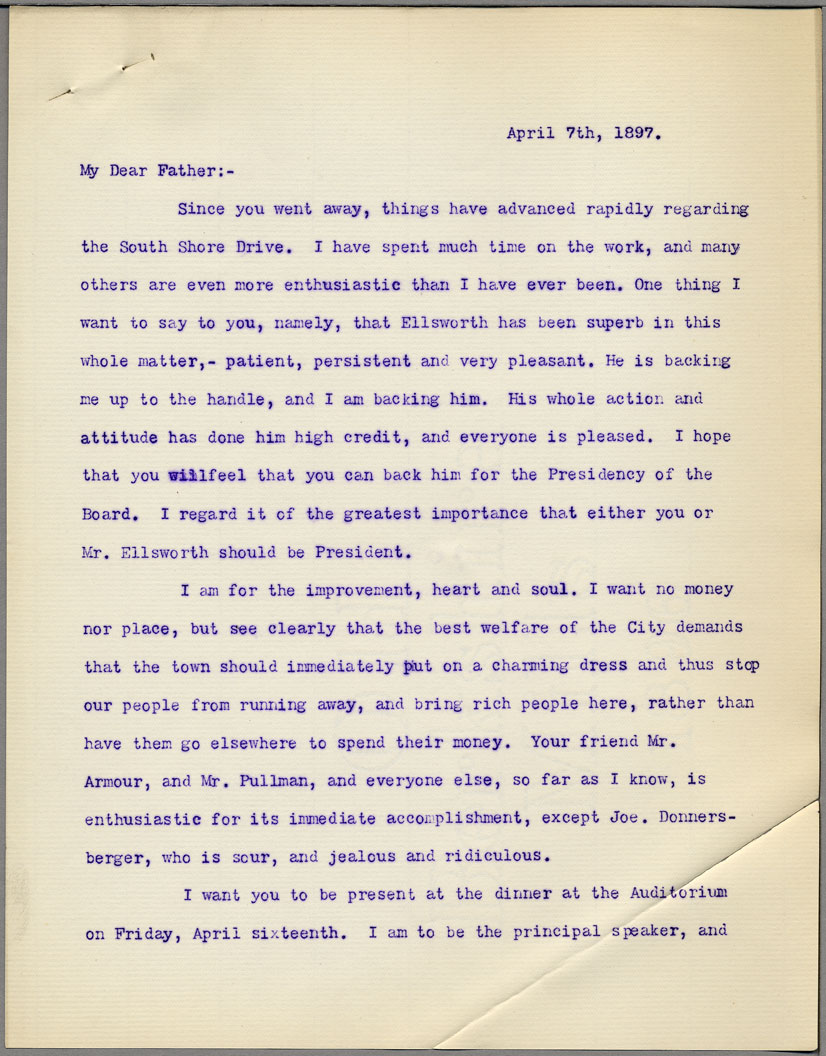 |
TITLE:
DATE:
SUMMARY:
PDF:
|
Burnham, Daniel H., to John B. Sherman
04/07/1897
Burnham's letters to his father-in-law John B. Sherman—manager of the Union Stock Yard & Transit Company and future President of the South Shore Commission—reveal a more personal side of the architect. Anticipating his final presentation of the lakefront plans on April 16, Burnham called the meeting his "great night" and hoped Sherman would attend to "add to the respect and dignity with which I am held." Burnham clearly knew that this would be his chance to prove himself as a city planner worthy of taking on Chicago's unique challenges. His ambition—for both the growth of the city and the advancement of his own career—is evident.
DOWNLOAD this document. (2 pages)
|
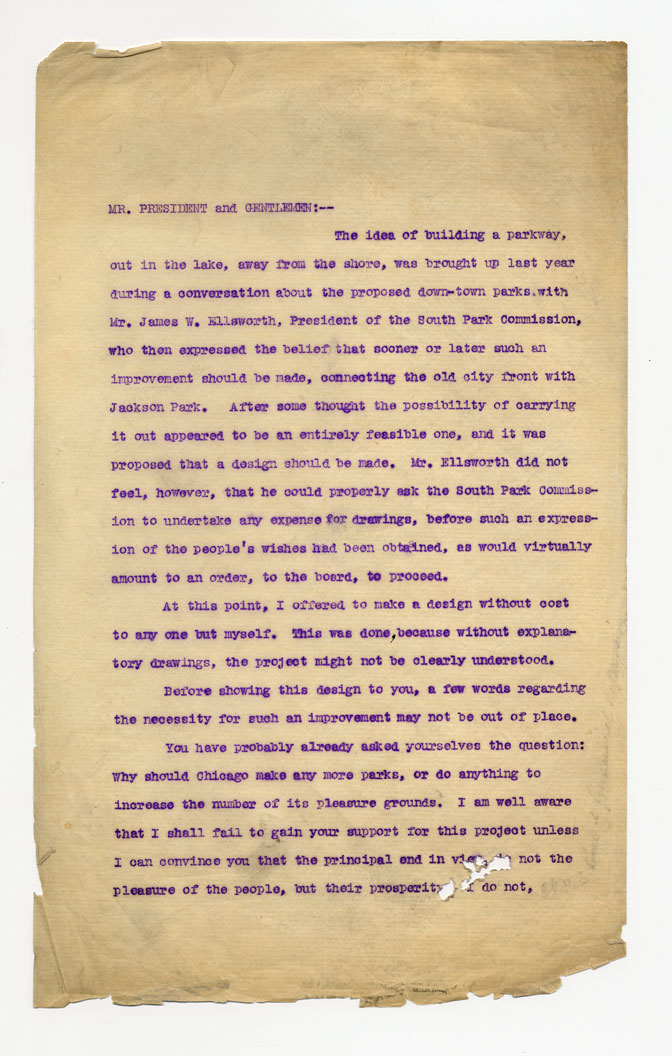 |
TITLE:
DATE:
SUMMARY:
PDF:
|
Typescript draft of address given at the Auditorium building on April 16, 1897
04/16/1897
Burnham presented his final plans to the public at a dinner at the Auditorium on April 16, 1897. Aware of the need to convince his business-minded audience of the financial justification for lakefront improvements, he argued that Chicago's continued prosperity depended on its beautification. Burnham expounded the idea of "sustainability," which to him meant the creation of an environment in which the city would attract and retain great wealth.
DOWNLOAD this document. (20 pages)
|





